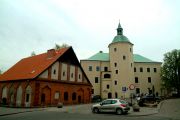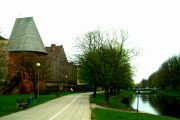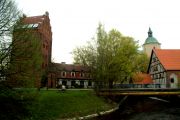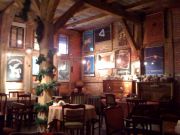Słupsk was once referred as 'little Paris', but frankly the days of its glory are gone. Yet, a few little gems remain to perhaps remind the visitors that the city must have been really great in the past. And it has one of Poland's best art galleries.
|
 |
 |
 |
 |
 |
 |
 |
 |
Pomeranian Princes' Castle
 |
 |
At times when Słupsk grew from being a village to being a city, strangely located some 18 kilometres from the shore of the Baltic Sea, historical records were not terribly well maintained. It is therefore rather uncertain when exactly it got its city rights. They were probably granted by Swantopolk II, the duke of Gdańsk in 1265, and confirmed in 1313 by the margraves of Brandenburg. But it made a massive mistake and instead of joining, it only became an associate of the Hanseatic League. It was an important trade centre anyway through an access to the port in Ustka at the mouth of the Słupia river, and a residence of the dukes of Pomerania. The duchy was associated with Poland between 1368 and 1478, and then in 1648 it was awarded to Brandenburg-Prussia. It returned to Poland in 1945. Virtually all the German population either fled or was expelled from the city. Their homes were populated by Poles, who were forcibly removed from eastern parts of the country annexed by the Soviet Union. A very sad episode of the peaceful times immediately after the saddest chapter of mankind's history.
Anyway, Słupsk's importance and position have been on a roller-coaster ever since. A number of factories were built in the area to allow the city to grow. It has therefore became famous for footwear manufacturing, bus and trolleybus making and repairing, and for the national school and training grounds of the police force.
Frankly, there are not that many reasons to come to Słupsk for an average traveller. Unless one has a strange fetish for footwear, a peculiar interest in the former Duchy of Pomerania, or passion for one of Poland's most extravagant painter - Witkacy. For Słupsk has the largest collection of this artist's paintings and sketches in the world.
Last time I was in Słupsk it was the end of April 2010. The city has managed to refresh a good number of its facades, particularly of the older and grand buildings in the centre. I thought I could write a few words about Słupsk.
|
|
| Favourite spots: |
 |
 |
 |
 |
 |
 |
 |
 |
The Slupia river and the Witches' Tower
 |
 |
By the river, there is this very curious tower made from dark red brick, which must have stood within the old city walls in the past. It is called the Witches' Tower and on top of it there is an artist's metal impression of a witch. For years, this structure has been significantly neglected but now it serves as an art gallery. One of its sides had been replaced by a massive window running several floors high. The tower looks its best from both river banks, the one it occupies and the one across, although the view from the latter is somewhat spoiled by the unattractive blocks of flats in the tower's vicinity.
I would like to think that the tower was used as a prison for women, who were considered too clever, too stupid, too ugly, too pretty, too quiet, too talkative, too everything, etc. and therefore declared witches. Perhaps they were tested in the river just there. If they floated, then they were definitely witches and then burnt. If drowned, then - oh, dear.
|
|
| What's really great: |
One of Słupsk's greatest attributes is that despite providing home to some 100 thousand people, it is still compact enough to be explored on foot. All of its significant sights are very close to one another. Without much sweating one can tick off all of the sights very comfortably within a few hours. And that's including visiting them inside!
The City Hall, standing tall just outside the old town area, which once was surrounded by a citywall, is complemented by two unmistakeably British red phone booths, which arrived from England, specifically as a gift to seal the friendship between Słupsk and Carlisle. The City Hall is a fine building in its own right. It has a curious asymmetrical three colour facade. But at the back, it looks more like a traditional timber-framed fisherman's house, with white filling and black painted logs and jetties.
|
|
| Sights: |
 |
 |
 |
 |
 |
 |
 |
 |
The Mill Gate, the Pomeranian Princes' Castle, and the Mill
 |
 |
Despite massive damages the city suffered at the end of WWII, some of which not entirely justified, Słupsk offers a few very interesting sights to discover. There is the castle of the dukes of Pomerania, and the adjacent mill and the Mill Gate. Another old, red brick gate remains in the other part of the city, the New Gate, which must have stood within the old citywalls, small part of which still stands.
There are two very unusual red brick churches, one - the Saint Mary's church - has a giant, thick bell tower and a large wooden crucifix, which apparently bled once in the 1980s causing mass pilgrimage from all over Poland. The other - Saint Jack's church - has, in contrast, a tall, very thin bell tower.
The castle has one of Poland's most significant museums/galleries. It is almost entirely dedicated to Witkacy, Polish painter, whose unusual extravagance manifested itself by him painting under the influence of drugs and alcohol, doses of which were noted carefully on the canvas.
|
|
| Accommodations: |
There are few accommodation options in Słupsk. The largest hotel, Hotel Staromiejski, standing in the heart of the city, is, sadly, not going to win any significant accolades. Apart from its very interesting facade, I guess.
It is therefore best to stay in Ustka, 18 kilometres north, right at the seaside. In the last ten years, a number of very nice and comfortable hotels have been built, two or three of which have been officially awarded four stars. Plus, there are many nice pensions and people of Ustka happily rent rooms, flats and houses. In the summer, a number of campsites are created to accommodate campers and backpackers. For Ustka is more accustomed to travellers and tourists than perhaps Słupsk is. The two towns signed an agreement, based on which a Dualcity was created to tighten their infrastructure and transport networks and better promote the region. The road between Słupsk and Ustka is in excellent condition and it only takes 15 minutes to travel between them.
|
|
| Nightlife: |
The only true nightclub in Słupsk is called Miami Nice, adjacent, but not associated with, the Hotel Staromiejski. It has been running its business for over 20, when a cinema, which formerly used these premises was closed for good. It attracts very strange mix of people and things are not always smooth these days. The door policy is stricter for the youngsters than it is for the thirtysomethings. There are two levels. Downstairs is a large dancefloor, and upstairs had a good bar, tables and sofas, and a small dancefloor. One can peek from the upper level to the downstairs party through glass panels in the floor.
There are other discos in Słupsk, but they come and go all the time, depending how successful they are in attracting customers. They are mainly frequented by teenagers, who manage to convince their folks that going boogie at night is a good thing for them.
In Ustka, particularly in the summer, there are more civilised options, one of which is called Viva, right in the harbour.
|
|
| Hangouts: |
 |
 |
 |
 |
 |
 |
 |
 |
Teahouse 'Herbaciarnia' by the Mill.
 |
 |
If there is a phrase 'the hangout scene', then the city has been developing it for a number of years, it seems to me. One of my favourite spots to sit down, catch up with my friends, drink tea and dig into cheese cakes is Herbaciarnia, the teahouse. It is based in a wooden historical building right by the Mill Gate, few yards from the castle. The teahouse serves hundreds of teas from around the world; black, green, white, herbal infusions, and flavoured. The decor is exceptionally pleasant. The walls have been decorated with many film posters, a piece of art for which Poland has been famous for around the world. And some of those posters are beautifully avant-garde and phenomenal making Herbaciarnia an unlikely art gallery.
There are a few other, very similar spots around the city. One of them is a coffee house, serving coffees from around the world in a pleasant venue, classical and retro-styled furniture of which is auctioned to customers on certain days. Fancy a comfortable sofa?
|
|
| Restaurants: |
|
Słupsk has enjoyed a strangely exceptional reputation for its local cuisine across the nation. Its invention called Karczma Słupska, set in a traditional Pomeranian house, had become so famous that copies of it were built in various parts of Poland and even overseas, namely in Płock, Rzeszow, Warsaw, Poznan, Katowice, Opole, Lublin, Bydgoszcz - all in Poland, and in Budapest, Leipzig and Chicago. I am not sure what made the cuisine so popular, but looking at the menu, there is plenty of fish (herring, salmon, tench, cod, sole, zander, trout - all permanently on the menu) prepared in a unique way with unlikely sauces, like cream, caper, dill, and it may come baked, roasted, fried or grilled and accompanied by bacon, eggs, and various combination of vegetables. There are also wild mushrooms, often served with cream and other traditional Polish dishes, not necessarily unique to Słupsk. And game - wild boar in juniper and wine sauce; deer in spicy sauce; and rabbit in cream sauce.
|
|
| Other recommendations: |
Ustka has been competing with a few coastal resorts for the title of Poland’s summer capital. For a number of years, it’s been voted by Poles as the best seaside town for summer holiday. The town boasts two large sandy beaches, eastern and western, divided by the mouth of the river Slupia. The eastern beach is adjacent to the main part of the resort and is complete with a waterfront paved promenade, where numerous bars, eateries, cafes, patisseries, souvenir stands, pine parks and a small concert hall are placed. The main characteristic of the eastern beach are the sand cliffs, some reaching over 50 meters in height. The western beach is flat, wider and less prone to abrasion. Both beaches are several kilometres long.
There are not many historical sights in Ustka itself. There is an old and great little lighthouse and a small Neo-Gothic church, both from the end of XIX century. And there are a few little old fishermen houses scattered around the old district.
|
|
Published on Tuesday June 1th, 2010
|
|
 Publish on Facebook
Publish on Facebook
|
Tue, Jun 01 2010 - 03:22 AM
 by jacko1
| I enjoyed this well written report, one of my now deceased uncles often used to talk about a Polish guy he made friends with when they were both flying fighter planes in WW2 and he came from this area, sadly he never saw it returned to the Polish people as ill health took him in the early sixties. Well done Krys. |
| Information: |
| Login if you are a member, or sign up for a free membership to rate this report and to earn globo points! |
|
| Netherlands Antilles |
|
|
|
|
 |
| New Caledonia |
|
|
 |
| New Zealand |
|
|
 |
| Nicaragua |
|
|
 |
| Norway |
|
|
 |
| Peru |
|
|
|
|
|
|
|
|
 |
| Poland |
|
|
|
|
|
|
|
|
|
|
|

|
